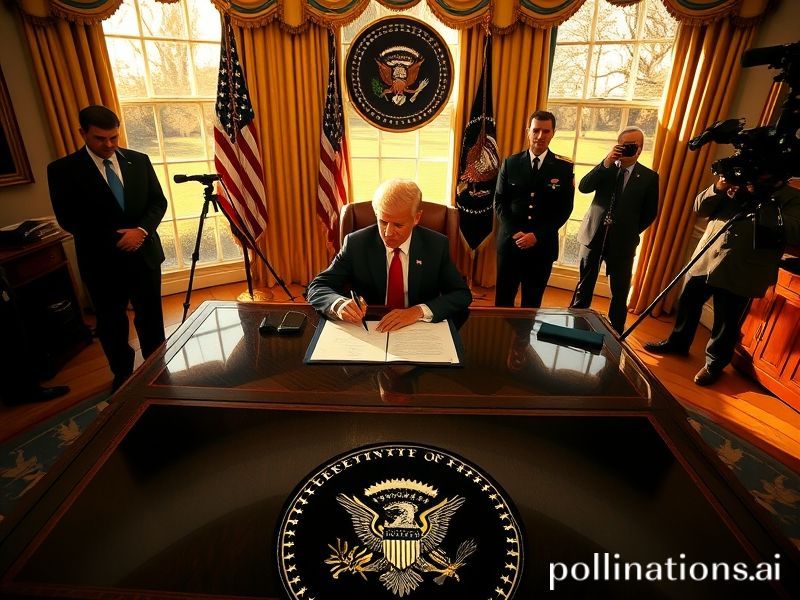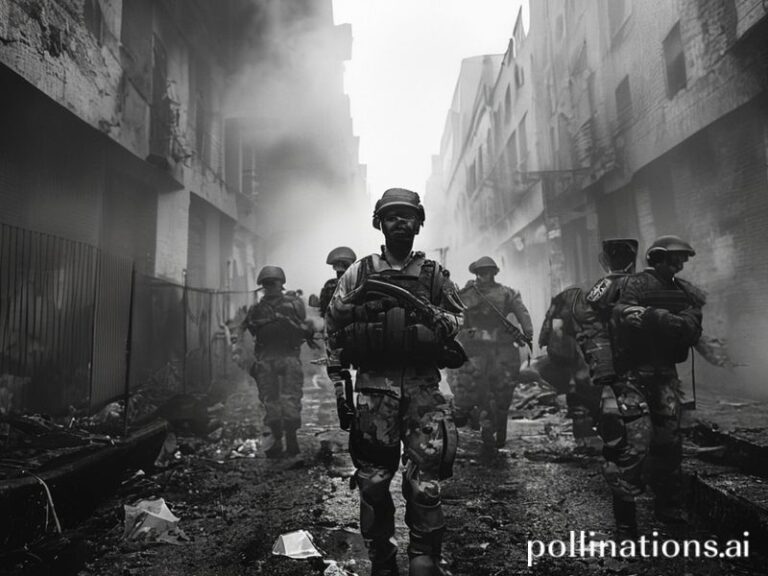Stroke of a Pen, Tremor Across the Globe: How Executive Orders Became the World’s Favorite Plot Twist
PARIS – Somewhere high above the Seine, a freshly printed executive order is being slid into a diplomatic pouch like a confession letter nobody wants to read aloud. Down on the boulevards, the French shrug: another head of state has discovered that the quickest route between “I have an idea” and “it’s now the law” is the stroke of a pen, parliamentary niceties be damned. The rest of the planet, meanwhile, is learning—sometimes overnight—what happens when one human signature ricochets through supply chains, currencies, and WhatsApp rumor mills from Lagos to Lahore.
Executive orders, those tidy little autocratic Post-it notes, are hardly an American invention. The Romans had “edicta,” the Ottomans loved a well-timed “firman,” and modern Russia practically runs on nightly “ukazy” that read like Kremlin fan fiction. Yet the American variant has become the global benchmark for both audacity and unintended slapstick. When Washington sneezes, the world checks its wallet, cancels its grain contracts, and frantically Googles “Section 232 tariffs” between sips of overpriced coffee.
Consider the chain reaction last spring after one particular order slapped surprise export controls on advanced semiconductors. By lunchtime in Taipei, stockbrokers were chain-smoking on balconies; by dinner in Berlin, economists were revising growth forecasts the way morticians revise obituaries. Meanwhile, in Shenzhen, a factory manager shrugged and rebooted his machines to produce slightly dumber chips—proof that Darwinism now favors the merely adequate.
The beauty of executive orders, from an international optics standpoint, is their cinematic brevity: no messy votes, no coalition governments collapsing in real time, just a crisp paragraph that rearranges the chessboard before the commentators have finished their croissants. The ugliness, of course, is that the chess pieces are alive, occasionally unionized, and prone to writing angry tweets in multiple languages. Nothing unites the Global South faster than discovering it has been reclassified as collateral damage between two blocs it never joined.
Europeans, ever the connoisseurs of bureaucratic theater, respond with their own performance art: the “emergency regulation.” Brussels technocrats stay up past their bedtime, draft 400 pages of countermeasures, then leak the PDF to the Financial Times so markets can tremble in high definition. It’s like watching a fencing match conducted entirely by photocopier.
Emerging economies have learned to hedge with exquisite cynicism. India quietly stockpiles Russian crude while quoting Gandhi on peace; Brazil reclassifies soybeans as “cultural heritage” to dodge quota rules; and Nigeria simply prints more naira—monetary policy by executive vibe check. Everyone agrees the rules have changed, but nobody can find the referee, probably because he was laid off in the last austerity package.
What’s truly remarkable is how quickly the private sector reverse-engineers the chaos. Multinationals now staff entire “sovereign risk karaoke” teams who translate each new order into supply-chain haikus: “If clause 3(b) triggers, divert vessels via Singapore, pray monsoon late.” The smartest firms have begun hiring failed poets—turns out dark metaphor is surprisingly useful when forecasting sanctions.
And yet, beneath the sardonic headlines lies an uncomfortable truth: executive orders have become the de-facto lingua franca of a planet too gridlocked for treaties. Climate accords die in committee; carbon tariffs arrive by midnight tweet. Nuclear diplomacy stalls; uranium import bans appear like unsolicited wedding gifts. It’s governance via plot twist—less Game of Thrones, more Game of Phones.
So the next time you see a somber anchor announce that “the President just signed a sweeping executive order,” pour yourself something strong and check your passport. Somewhere, a customs officer is already practicing new stamps, a cryptocurrency exchange is rebooting its servers, and a farmer in Argentina is Googling weather patterns in Iowa. The pen, as they say, is mightier than the sword—especially when it’s backed by the world’s reserve currency and a profound allergy to congressional debate. Sleep tight; tomorrow’s order drops at dawn.







